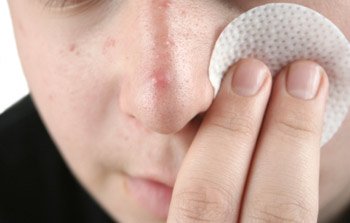Acne Cysts
Severe forms of Acne Cysts

Having a severe skin problem such as acne cysts or nodules can disfigure a person and greatly affect his or her ability to live normally. Although my acne was not as severe as some of the acne described below, I still experienced the damaging psychological effects of cystic acne. You can read my personal story about my struggles of dealing with acne in everyday life. It certainly made socializing very challenging.
Although you may not feel like or want to go see a dermatologist, it would help you a lot to get professionally advice and to start the research process on healing your skin.
What are acne cysts?
Acne cysts occur when hair follicles get blocked deep beneath the surface of the skin. The dead cells and bacteria accumulate and grow, and eventually a sac develops. The collection of dead cells and bacteria that leak out of the sac smells something like rotten cheese. Research is still being done to try and understand why some people get so many cysts, while others don’t.
This type of acne tends to be more common in males than females, and often occurs between the ages of 18 and 30.
If you are diagnosed with this condition, make sure you get involved in a group (there are several online) where you can have emotional support and also exchange treatment histories to learn from each other.
Learning about the causes of cystic acne might help you clue into what changes you can make to help reduce the occurence of cysts.
There are 4 types of severe acne:
- Acne conglobata
- Acne fulminans
- Gram negative folliculitis
- Nodulocystic acne
Acne Conglobata
These acne cysts are chronic, and to date, no one has found out what causes them. They are characterized by deep holes, severe scarring and damage to the skin, inflammation, whiteheads and blackheads that can appear anywhere on the body, and continual growth of nodules.
Sometimes, acne conglobata can occur in skin where acne has been gone for a long time.
Accutane (isotretinoin or roaccutane) is usually recommended for this form of acne, although you may have to take several courses of it for many years before improvement occurs. Even then, you still need to keep an eye on your skin and watch for any signs of recurrence.
Acne Fulminans
These cysts develop suddenly and are extremely destructive (what severe acne isn’t?). These are characterized by ulcerating acne, and accompanied by fever, inflammation, and joint pains.
An interesting relationship has been found. For those with this acne, they may previously have been treated unsuccessfully for another form of severe acne.
What does this mean? Does it mean those previous treatments had something to do with worsening the disease? This is still unknown, but it is certainly food for thought.
Common treatment for this acne includes high doses of oral antibiotics like erythromycin, oral steroids, salicylates, dapsone, or isotretinoin.
Gram Negative Folliculitis
These acne cysts are actually brought on by the use of topical antibiotics or tetracycline for a long period of time. This is because the bacteria are able to build resistance to the antibiotics which leads to bacterial infection. Think about it – acne brought on by medication that is supposed to treat acne….
This type of acne is characterized by clumps and bunches of whiteheads, pustules, and red inflamed bumps.
Stronger antibiotics which can kill off the bacteria, or isotretinoin, can correct this type of acne.
Nodulocystic acne
These are severe acne with cysts. They can be very painful cysts that occur in one area or anywhere on the body.
The nodular cysts develop from papules and pustules in the outer layer of the skin.
Isotretinoin and antibiotics are commonly prescribed for nodulocystic acne, or intralesional corticosteroids.
Other treatments for cysts include surgical incision and removal, especially for large cysts that are resistant to treatment. These are drained in the doctor’s office to minimize scar damage.
To learn more about acne cysts,
click here.
Sources:
Jansen T, Burgdorf WH, Plewig G; Pathogenesis and treatment of acne in childhood.;Pediatr Dermatol 1997 Jan-Feb;14(1):17-21.[abstract]
Marsden JR, Shuster S, Lyons F; Is cyclic low dose cyproterone acetate and ethinyloestradiol effective in acne?;Lancet 1983 Jul 23;2(8343):215.
Rosner IA, Burg CG, Wisnieski JJ, et al; The clinical spectrum of the arthropathy associated with hidradenitis suppurativa and acne conglobata.;J Rheumatol 1993 Apr;20(4):684-7.[abstract]
Other types of acne:
Acne cyst ovarian : Learn about this condition that many women experience.
Genital acne : Is it different from other types of acne?
Looking for
acne product reviews such as
Proactiv skin care? Our site has all the scoop on these products.




